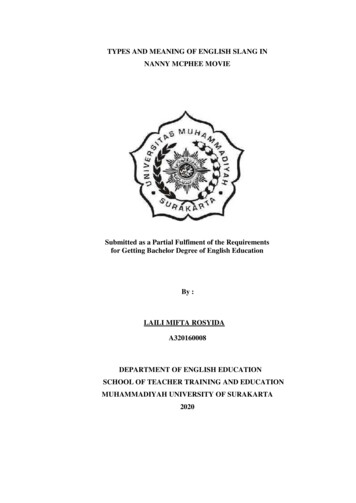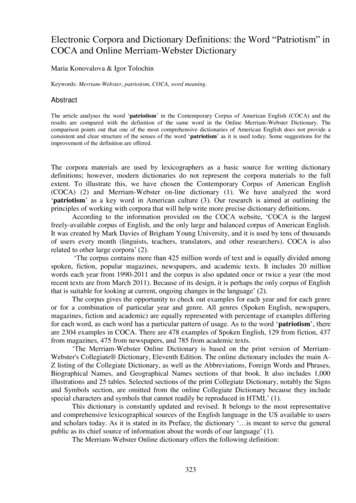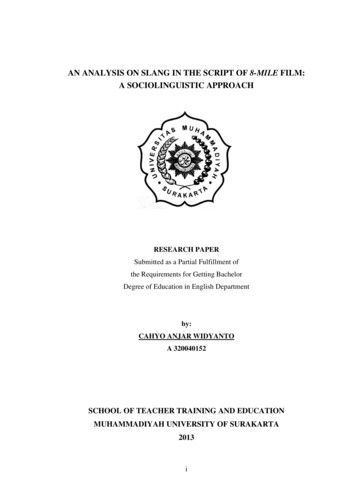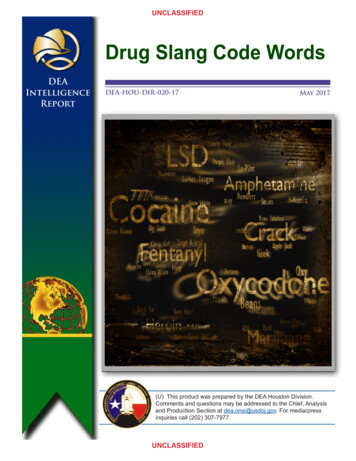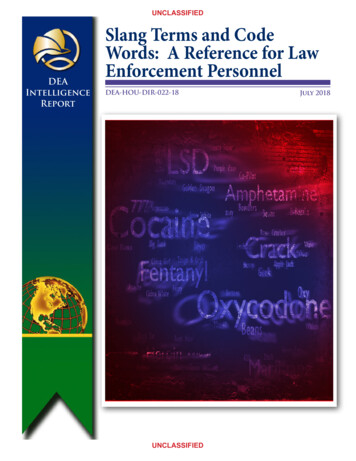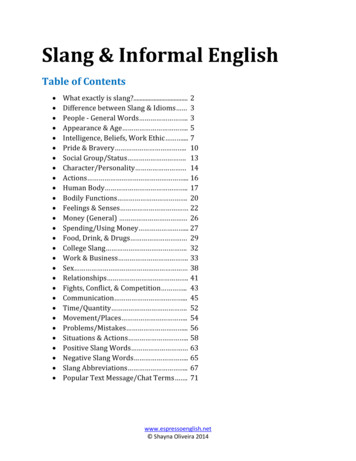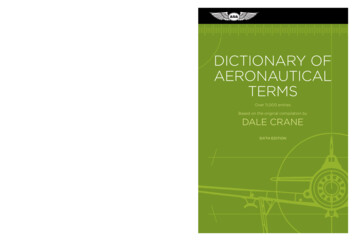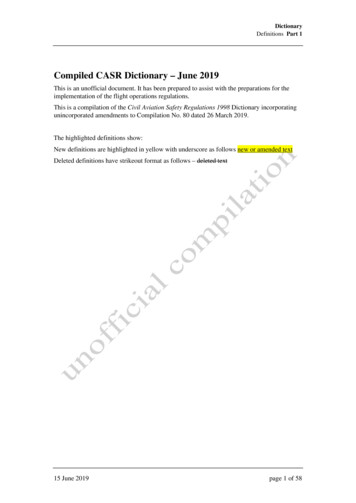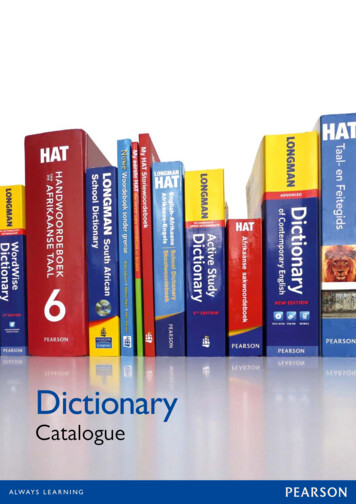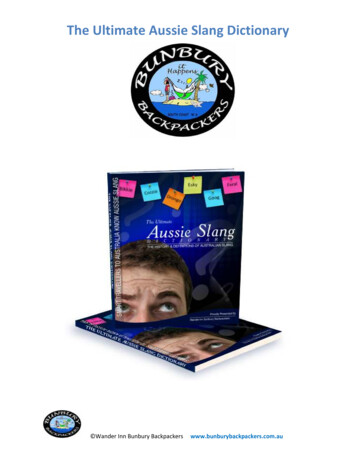
Transcription
The Ultimate Aussie Slang Dictionary Wander Inn Bunbury Backpackerswww.bunburybackpackers.com.au
Aussie SlangTable Of ContentTopicIndexDisclaimerAbout Wander Inn Bunbury BackpackersConnect With Us On Social MediaAustralian slang - a story of Australian EnglishAustralian slang – A to DAustralian slang – E to HAustralian slang – I to LAustralian slang – M to PAustralian slang – Q to TAustralian slang – U to ZWhat Is Next?www.bunburybackpackers.com.auPage 1Page 1
Aussie SlangDisclaimerAll contents copyright 2011 by Wander Inn Bunbury Backpackers. Allrights reserved. No part of this document or the related files may bereproduced or transmitted in any form, by any means (electronic,photocopying, recording, or otherwise) without the prior writtenpermission of the publisher.Sharing This Document:There was a lot of work that went into creating this document. I can't tellyou how many countless hours were spent putting together this eBook.That means that this information has value, and your friends, neighbors,and co-workers may want to share it.The information in this document is copyrighted. I would ask that you donot share this information with others. You subscribed to this book, andyou have a right to use it on your system. Another person who has notsubscribed this book does not have that right.If your friends think this information is valuable enough to ask you for it,they should think it is valuable enough to subscribe on their own. Afterall, the eBook is FREE and anyone should be able to afford it.It should go without saying that you cannot post this document or theinformation it contains on any electronic bulletin board, Web site, FTPsite, newsgroup, or . well, you get the idea. The only place from whichthis document should be available is the Wander Inn BunburyBackpackers Web site. If you want an original copy, visit our website.www.bunburybackpackers.com.auPage 2
Aussie SlangAbout Wander Inn Bunbury BackpackersWe are a very friendly, clean and homely hostel with a great package of activities forBackpackers & budget travellers to enjoy their stay in Bunbury.We are situated only 100 metres from the heart of the city, and the beaches. Our accommodationincludes singles, twin, doubles and dorm style rooms, all of which are clean and comfortable. Wehave separate male and female communal bathrooms, laundry facilities, a fully equipped kitchen,dining area, lounge and games room. Our gardens and barbeque area are the perfect place torelax and meet new friends!We offer bike hire, tour and accommodation booking service and information for exploring thenearby forests, beaches and wineries. We can also assist you with finding work.Bunbury is the Gateway to the South West and offers something for everyone. Whether it begetting back to nature and visiting our friendly dolphins, feeding the local kangaroos or taking awalk through the Tuart Forrest or 10,000 year old mangroves. Head to one of our golden sandybeaches where you can try body boarding in the surf at Back Beach or have a more relaxed swimin the calm waters of Koombana Bay.For the more adventurous traveller you can Sea Kayak with the dolphins, explore W.A's newestdive wreck; The Lena or head for the sky by taking the controls and flying a small plane. In theevening visit one of the many restaurants, cafes, bars or one of our excellent nightclubs to end aperfect day.How could we forget our free home made cake and coffee every day at 6.30pm when everyonegets together to share stories, have fun and make new friends.We have great weekly rates too. Please ask us!Phone: 61 8 9721 3242Fax: 61 8 9721 w e Call within Australia 1800 039 032Page 3
Aussie SlangFriend UsLike ryBackpackers/137282623000612Follow Ushttp://twitter.com/wanderinnVisit backpackers.com.auPage 4
Aussie SlangAustralian slang - a story of Australian EnglishSlang can be seen as a demonstration of how experience shapes language and also how languageshapes identity.Australia's everyday language, which is rich with slang, reflects experiences from the country'shistory. From borrowings of Aboriginal language words, through convict sources, the goldrushes and bushranging to the First World War, words have emerged to describe essentialaspects of the Australian character and identity.Some studies of the slang of the First World War, remind us of how slang reinforced a sense ofnational identity among Australian troops when they were staying far away from home, fightingin countries where people spoke foreign languages. 'Don't come the raw prawn' is used nowadaysto warn off someone when they attempt to impose their will. This was adapted from the SecondWorld War.Australians have their own styles and characters in using the language, vocabulary,pronunciation and accent and Australian slang contributes to a vocabulary that is understood bymost of the Australians, what could be called the Australian 'idiom' or 'vernacular. In somedictionaries the past and present Australian slang or colloquialisms are well documented. Evenso, determining the exact definition of anAustralian colloquialism is difficult.Australian slang utilised humour, wit, rhymes, flash language, the bizarre experiences of thebush and the beach, the familiar and the personal to realise terms that could describe experiencesthat were often new or transforming. For example, 'having a bash' at something is similar to'giving it a burl', and both phrases reflect a history of Australian improvisation and hard work aspart of working in the bush.Sydney Baker, author of a number of works about slang, believed that the Australian's 'greatesttalent is for idiomatic invention. It is a manifestation of our vitality and restless imagination'.Amanda Laugesen, in her study of the slang of the First World War, reminds us of how slangreinforced a sense of national identity among Australian troops far away from home, fighting incountries where people spoke foreign languages. In the Second World War, 'Don't come the rawprawn' was used and is still used to warn off someone when they attempt to impose their will.www.bunburybackpackers.com.auPage 5
Aussie SlangAustralian slang contributes to a vocabulary that most Australians understand, and what could becalled the Australian 'idiom' or 'vernacular'. There are a number of dictionaries devoted todocumenting either past and present Australian slang or colloquialisms. Even so, determining theexact definition of an Australian colloquialism will always lead to a lively and interesting debate.Kangaroo was borrowed even prior to colonisation. The convicts gave us 'muster', 'bolter','rollup' and 'servants of the crown'. Bush rangers gave us the 'bush telegraph'. A key part of theAustralian psyche, 'the digger', came out of the First World War, the term adapted from its use inthe gold rushes.Substitutions, comparisons and abbreviationsOne of the most common forms of slang is through substitution and comparison. Removing onepart of a phrase and replacing it with a word that rhymes is a form of substitution known asrhyming slang. For example to 'have a Captain Cook ' means to have a look. Substitution couldalso include a 'metaphor', where one word or idea stands in for another. There is no town inAustralia called 'Woop Woop', however it has been a popular and evocative byword for a remotelocation, and has been in use since the 1900s.Colloquialisms that take the form of a comparison often raise startling images, for example: 'flat out like a lizard drinking' (working very hard on a task) or'standing like a bandicoot on a burnt ridge' (feeling lonely and vulnerable).Dazed and confused, someone will wander 'like a stunned mullet';in a furious rage, they will be 'mad as a cut snake' and,in a state of undeniable lifelessness they will be 'dead as a maggot'.Australians also demonstrate a strong impulse to abbreviate and alter word endings, resulting in'barbie' for barbecue, 'arvo' for afternoon, 'cossie' for swimming costume and 'blowie' forblowfly.One of the most important influences on Australian English has been Aboriginal languages.There are a number of Aboriginal words that have been adopted colloquially within AustralianEnglish, for example 'boomerang', ' humpy' or 'corroboree'. One of the first words collected waskangaroo.In 1770 after the ship had been damaged on reefs, Captain James Cook was forced to beach theEndeavour for repairs near present-day Cooktown. He and Joseph Banks collected a number ofAboriginal words from the local Guugu Yimidhirr people . On 12 July 1770 Banks recorded inwww.bunburybackpackers.com.auPage 6
Aussie Slanghis journal 'Kill Kanguru', and on 4 August Cook wrote: 'the Animal which I have beforementioned called by the natives Kangooroo or Kanguru'.When the First Fleet arrived in 1788 there were some 250 distinct languages, and at least 600dialects amongst Australian Aborigines. In the first 100 years of European colonisation about400 words were borrowed into Australian English from some 80 languages.The Dharuk language was spoken in the area around Sydney, and this language provided a largenumber of words recorded between 1788 and 1803. They include: boomerang (1790), corroboree(1790), dingo (1789), gunyah (1803), koala (1798), nulla-nulla (1790), waddy (1790), wallaby(1798), waratah (1788), warrigal (1790), wombat (1798) and woomera (1793).As more of Australia was explored and settled, words from other aboriginal language emerged.The Kamilaroi language of eastern New South Wales (NSW) pruned words such as brolga(1896), budgerigar (1840) and bora (1850). Borrowings from the Yuwaalaraay language ofnorthern NSW include: bilby (1885) and galah (1862). Borrowings from the Wiradhurilanguages of south-western NSW include: corella (1859), gang-gang (1833), kookaburra (1834)and quandong (1836).Other hybrid words have emerged through a 'pidgin' or early adaptation of English words todescribe aspects of Aboriginal that was spoken in the 1800s. Most of these have nowdisappeared, but two important words have survived. These are bung (1841) and yakka (1847),both borrowed from the Yagara language of the Brisbane area.The phrase 'gone walkabout' was originally used in the early 1800s to describe the seasonalpatterns of movement of Aborigines across their land or country. It is now used more generallyand sometimes inaccurately to describe a journey away from home. Australian newspaper TheSydney Morning Herald even reported in 1981 that 'Lady Diana takes a Royal walkabout in herstride' (25 July 1981, p.10).Major Mitchell, the Surveyor-General of NSW 1825–1855, surveyed vast tracts of land and wasone of the few surveyors who took an enlightened view of selecting Aboriginal place names forgeographical features. The official body for naming and recording details of places andgeographical details in NSW (known as the Geographic Names Board), has a dual namingpolicy, acknowledging Aboriginal culture through naming of places in NSW area.www.bunburybackpackers.com.auPage 7
Aussie SlangConvict sourcesThe language that emerged after the settlement of Australia as a British penal colony reflectedthe life conditions of settlement, authority and punishment.'Flash language' of the convictsIn 1793 Watkin Tench, in A Complete Account of the Settlement at Port Jackson , wrote of the'flash language' of the convicts. A convict named James Hardy Vaux wrote his New andComprehensive Vocabulary of the Flash Language in 1812. This was first published in 1819 asan appendix to Vaux's Memoirs. While the dictionary was produced in Australia, it is largely acollection of early 1800s London underworld slang.The term “swag” similarly has its origin in thieves' slang and originally referred to a thief's bootyor plunder. By the mid-1800s, “swag” was used to describe the collection of personal belongingswrapped up in a bedroll, usually carried by a bush traveller. This is the beginning of theswagman tradition which later arose in gold-rush context. Waltzing Matilda, a well knowAustralian song has helped to cement the term 'swag'.The convict systemMost of the recorded convict slang had to do with the convict system. Many of these historicallyspecific terms have now disappeared from common usage. For example, the word 'pebble' oncereferred to a convict who was difficult to deal with and had the hard qualities of stone. A 'paperman' was used to describe a convict who had been granted a conditional pardon, with documentsto prove the pardon.'Magpies' and 'canaries' described the black and yellow, or straight yellow uniforms worn byconvicts. The intention of Governor Macquarie in 1814 in directing that convicts who committedfurther crimes to wear 'half black and half white' was to make the wearer stand out and thus deterfurther escape attempts. Later in Van Diemen's Land convict men working on the gangs wereordered to wear the conspicuous 'magpie' outfit in yellow and grey.www.bunburybackpackers.com.auPage 8
Aussie SlangThe history of the convictsThere are cases of convict words being used in the conversations of Australians today. Theyinclude 'servant of the Crown' and 'public servant' (as opposed to the civil servants in Britain).In 1826, P Cunningham noted that convicts were 'spoken of under the loyal designation ofgovernment-men, the term convict being erased by a sort of general tacit compact from ourBotany Bay dictionary as a word too ticklish to be pronounced in these sensitive latitudes'.In 1843 Charles Rowcroft, in Tales of the Colonies , wrote: 'I must warn you that we never speakof the convicts in this country by that term; we always call them 'government men'; or on someoccasions, prisoners; but we never use the term 'convict', which is considered by them as aninsulting term'.A convict was often referred to as a public servant who was later applied to anyone who workedfor the government.The word 'muster' in the Australian convict colony was applied to an assembly of convicts, andby the mid-1800s it was being used to refer to the gathering together of livestock for countingand branding.The gold rushes provided Australian English with some lasting terms. The importance of theterm 'digger' in Australian slang and myth derives from the First World War, but its use in thatwar was derived from the analogy drawn between the trenches which the soldiers had to dig andthe often deep holes which had to be dug in the search for gold. It has now been shortened to“Dig” and still remains a military term today.Similarly 'fossick', which now means 'to rummage or search around or about', has its origin onthe goldfields. The word fossick comes from British dialect where it meant 'to obtain by asking,to ferret out'.On the goldfields it had two meanings: . 'To steal gold from other diggers, especially from anunattended claim' .The transferred usage was often ironic: 'If one in want of a dinner called athis neighbour's tent at mutton time he would be a fossicker'. But it is the first meaning which hassurvived into contemporary Australian English.'Roll-up' in the sense of 'a mass meeting of miners to consider an individual grievance or an issueof common concern' was used in mining contexts well into the1900s. By the end of the 1800s itwww.bunburybackpackers.com.auPage 9
Aussie Slanghad developed its transferred sense of 'an assembly', which is now its primary meaning inAustralian English.The phrase 'to hump one's swag' in the 1870s–1900 achieved its widespread use in gold miningcontexts. All of the early citations (1851–1867) use the phrase in referring to diggers, and thediggings' phrase is the one which later gives rise to the phrases 'to hump one's drum' (1870), 'tohump one's bluey' (1891), and 'to hump one's Matilda' (1902).The development of bushranging in Australia is an off-shoot of the convict system. The firstbushrangers were convicts, escaping either from imprisonment or from bad masters when inassigned service. To them, we owe the terms 'bail-up' and 'stick-up'. The bushrangers of the post–gold rush era are the more familiar 'Ned Kelly' kind. To them we owe the development of suchterms as 'bush telegraph', 'cattle duffing', 'gully raking', and 'poddy dodging'.First World WarDuring the First World War, many new words entered the vocabularies of all nations whoparticipated and it appears to have been a particularly rich source of word creation. Civilianswere much more affected by the First World War than by previous conflicts. Language wastransformed with ideas, concepts and words as people—as civilians, as soldiers and at home—came to the terms with the experience.Eric Partridge, a New Zealander who served in the Great War and a great authority on war slang,noted that jargon and slang need to be considered separately. Jargon is seen as technicalterminology devised by a particular group and part of the continuity and integrity of the forces.Slang, on the other hand, is more likely to avoid technical terminology altogether, in favour offigurative, inventive and humorous allusions to the thing being described or referred to, slangsometimes serves to make the unfamiliar more familiar.Amanda Laugesen has observed that the First World War contributed much more to slang andlanguage creation in Australia than the Boer War or the Second World War, and that thelanguage creation had a more lasting impact.www.bunburybackpackers.com.auPage 10
Aussie SlangDigger dialects and a glossary of AIF (Australian Imperial Forces) slangW. H. Downing's who enlisted in 1915 serving in Egypt and France, wrote Digger dialects whichwas first published in December 1919. Downing wrote:Australian slang is not a new thing; but in those iron years it was modified beyond recognitionby the assimilation of foreign words, and the formula of novel or exotic ideas.Downing also noted further about the digger dialects that, 'Neither is it definite, for there aredivergencies within every division; even within every brigade. In the Flying Corps it is differentfrom the speech of the Infantry.' Downing saw the new slang as 'a by-product of the collectiveimagination of the AIF'.In the early 1920s, the proposed Australian War Memorial (AWM) librarians were collecting andorganising the official documents and records of the war, and worked to collect a glossary of theAIF slang. This first draft of the AWM glossary is accompanied by a letter from Albert GeorgePretty, the AWM's chief librarian, to the Museum's director, John Linton Treloar, finallypublished online and annotated by the Australian National Dictionary Centre, 2002.Australian Flying CorpWhile aviation itself introduced new terms to the language, the First World War AustralianFlying Corp developed specific phrases such as 'ace'. This was used to describe a pilot who wassuccessful in shooting down large numbers of the enemy planes. Ace was thought to haveoriginated from the ace in a pack of cards.The message 'How's your father' was sent from an Artillery machine when wanting something todo to keep him amused. Weather conditions of low clouds or thick fog making flying impossiblewas often referred to as “Soupy”.What functions did the slang serve?Humour was very important as a means of coping with the impact of war. Soldiers, throughslang, were able to deflect the true horror of warfare, but the slang perhaps also allowed for anarticulation of that horror that they might otherwise have suppressed. . To be dead was referredwww.bunburybackpackers.com.auPage 11
Aussie Slangto as 'hung on the wire', 'pushing up daisies ', to have 'gone west ', to be 'up in Annie's room ', tohave been 'smudged ' or to be in 'cold storage '.Will Dyson observed in 1918 that the slang was an expediency to allow the Digger to express butdisguise deep feelings; 'they have evolved a language compound of blasphemy and catch phrasesin which they can unpack their hearts without seeming to be guilty of the weakness of emotion'.Long Lasting ImpactThe use of distinctive Australian slang 'helped to forge a bond that in the years after the war fedinto a distinctive national myth which emphasised mateship, masculinity and other values thathad been forged on the battlefield'.Some of the slang words and phrases from the First World War remain in use today. These slangterms, include 'cobber', 'digger', 'dinkum', 'mate', 'dinky-di', 'furphy', 'Aussie' and 'the good oil'.'Furphy' (a rumour) was an Australianism coined to reflect the cynicism of the Australian troopswith the information they received about the fighting in which they participated. 'Aussie'(meaning both Australia and an Australian) was first recorded during the Great War. 'ANZAC'was created in 1915 and became seminal to Australian identity, redefined as the ANZAC spirit.Gentle InsultsAffectionate insults or backhanded compliments are used extensively in AustralianColloquialism. A clumsy friend or colleague may be called a 'dag', 'galah', 'drongo' or 'boofhead'.There are also many ways of saying that someone is not very useful, for example: 'couldn't find a grand piano in a one-roomed house''couldn't blow the froth off a glass of beer''a chop short of a barbie''useless as an ashtray on a motorbike'.www.bunburybackpackers.com.auPage 12
Aussie SlangPerverse reversalsAs writer, poet and member of the modernist literary and artistic movement the Angry Penguins,Max Harris points out in his book The Australian Way with Words , 'one of the Australian ratbagtraditions is to take a word and perversely use it as the opposite of its intended meaning.' A wellknown illustration of this is the word 'bluey', a nickname for someone with red hair.Nicknames describing Australian StatesIn the spirit of friendly rivalry, Australian states and territories are identified through nicknames.For example, Queensland, where the northern climate encourages tropical fruit growing, is theland of 'banana benders', and Western Australia, home to some of Australia's most magnificentbeaches, is populated by 'Sandgropers'. Some terms are less established, for example Victorianswere once called 'gum-suckers' when the resin from gum trees (type of Australian tree alsoknown as a Eucalypt) was used as an early substitute for chewing gum.Interestingly, while certain distinct phrases are limited by geography, there is very little regionalvariation in Australian colloquialisms considering the distance between the main populationcentres.Lost phrasesIt is important to remember that a key feature of colloquialisms, slang or 'Australianisms' are thatthey are never static and often shift meaning or spelling over time. Inevitably, Australian Englishis constantly shedding colloquial phrases.It is unlikely that someone will ask you to share a 'puftaloon' (a fried scone) at a 'shivoo' (party).Even in the colder, southern regions of Australia, it is rare to hear the phrase 'cold as a polarbear's bum'. However, browsing through current and historical dictionaries can offer afascinating map reflecting the changing economic, political and cultural influences in Australiansociety.Acknowledgment is kindly given to http://www.australianhistory.org/australian-slang lang/ for providing information.www.bunburybackpackers.com.auPage 13
Aussie SlangAceexcellent! very good!Act the goatto behave foolishly.Aerial pingpongAustralian Rules footballAfter darkshark (rhyming slang).Aggrosomeone who is aggravated, upsetAkubrawide brimmed felt hat used for protection from sunand weather.refreshing afternoon sea breeze in southernWestern Australia.a stupid personAlbany doctorAlfAll froth and no beerpertaining to a large posterior(Western Australian expression).superficial; silly.All laired updressed in your best clothes; flashily dressed.All over the place like a mad woman's breakfastin a state of chaos.All piss and windboastful; full of shit.All wool and a yard wideauthentic and totally trustworthy.Alley upto pay back a debt.Alligatora horse.Alone like a country dunnyalone; lonely; abandoned.Amber fluidbeer.Amber fluid / nectarbeerAmboambulanceAmen snorterclergyman.Ankle - bitertoddler; small child.Ankle bitersmall childAnts pantsAny old joe blow will tell youthe height of fashion or person has a high opinion ofthemselvesany one you don't even know will tell youApple eaterssomeone from TasmaniaApple isleTasmania.Applesok; all right (eg: she'll be apples).Apples, she'll be :It'll be alrightArgue the tossto dispute a decision.All behind in melbournewww.bunburybackpackers.com.auPage 14
Aussie SlangAround the twistsomeone knowledgeable about sport but does not play it(one who sits on an armchair and watches sports)insane.Arse - lickersycophant; yes-man (also called a boot - licker)Arse - upto make a mess of things; to fall over.Arse aroundto fool around.Arse offto depart; to leave.Arsed outdismissed; fired from current job.Arseholedespicable person (eg: He's a real arsehole).Arseholes!!an exclamation meaning "nonsense".ArvoafternoonAs long as your arse points to the groundindefinitely.As much chance as pushing shit up hillnot a chance at all.Aussie (pron. Ozzie)AustralianAussie battleran ordinary Australian trying to make ends meet.Aussie salutethe flapping away of ever - persistent flies from one's face.Australian as meat pietypically or authentically Australian.Autumn leafa jockey who continually falls off.AV Jennings marriageAvosyour first marriage (AV Jennings is a builder inAustralia specialising in building houses for young marriedcouples)someone is not trying hard enough in their sport,and you want them to (this is yelled to give thema bit of a push a long)cricket fans' cry to a slow batsman(also used in other sports).avocadosAway with the pixies/birdiesday dreaming; intoxicated; in another world.Awning over the toy shopmale beer belly (the toy shop being the malereproductive organs)money.Armchair sportsmenAvagoyermug'Ave a go, ya mug!!!Axle greaseB.y.o.Bachelor's & Spinster's Ball- a singles party usuallyheld in rural areasbring your own - drinks/food.Back of Bourkein the outback, a very long wayBackdoor banditderogatory term for homosexual a man.Bag of fruitsuit (rhyming slang).Bagmanswagman; tramp.B & s - ballwww.bunburybackpackers.com.auPage 15
Aussie SlangBagman's gazettemythical source of bush rumours.Bailleave, depart usually angrilyBail outdepart, usually angrilyBail upto corner somebody physicallyBald as a bandicoothaving no hair.Ball and chainwife (also known as trouble and strife).Balls upto mess up; a real mix up; chaotic state of affairs.Banana-benderssomeone from QueenslandBananalandQueensland.Bananassomeone going crazy with angerBandicoot gunyahmakeshift bushman's shelter.Bang onhit the target right in the middle, OR it's right, or correctBanged uppregnantBangerssausages.Bangs like a dunny door in the winda promiscuous woman.Banjofrying pan; shoulder of mutton (an old sheep).Bar fliesBarbiepeople men who drink and talk in the front bar of apub for hours and hoursbarbecue or B.B.Q.Barcoo busterwesterly wind in outback Queensland.Barcoo rotfestering skin disease.Barcoo spewillness accompanied by attacks of vomiting.Bark on the lawnto vomit outside.Barley!Barmy as a bandicootword used to call for a truce(sometimes referred to as barlese!).insane.Barneyloud altercation; physical struggle; fight.Barra(Fish) BarramundiBarrackto support and cheer on for your favourite team.Bashwild party.Bash (someone's) earto talk at length to a boring degree.Bash, give it ahave a go, make an attemptBasket casesomeone on the edge of mental collapseBastardmost unpleasant person; affectionate name for a mate(eg: What have you been up to, you "old bastard"?).www.bunburybackpackers.com.auPage 16
Aussie SlangBastard from the bushrustic individual.Bat the breezeto talk idly.Bathersswimming costume/suit; cozzies.Batscrazy.Battleaxe, oldwife or mother-in-lawBattlerBazzalandsomeone who works hard, struggling financially,against the oddsAustralia.Beakyour noseBean counteran accountantBeat the living daylights/shit out ofadminister a violent thrashing.Beaten by a blowBeating around the bushshearer slang, running shears from one end of sheepto the othernot getting to the point on a subjectBeaut/beautybeautiful - .great, fantasticBeauty!; beaudy!.exclamation of approvalBeecham's pilldill; idiot (rhyming slang).Beefcomplaint; to complain.Been aroundto be sexually experienced.Beer gutbulging stomach (mans) often associated withheavy drinking.knock off time, time to finish what you are doingand have a well earned beersmallest possible (eg: You've got a bee's dick of achance of winning the lottery).ring them on the phoneBeer o'clokBee's dickBell, give some one aBelt updiving incorrectly into water with the stomach breakingthe wateryou are asked to stop talking or be quiet, in a angry wayBerkoangry in a unreasonable wayBerko, gonegone mad, looks like going madBetchaI bet you! (wager)Better halfyour partnerBex, going to have aBig bikkiesyou are going to settle your self down from some sort ofstress - usually a cup of tealots of moneyBig notebrag or boast about your self.Big smokebig city or townBelly flopwww.bunburybackpackers.com.auPage 17
Aussie SlangBig-note oneselfbrag, boastBikeymotorbike or cycle rider.Bikkiebiscuit (also "it cost big bikkies" - it was expensive)Billabongwaterhole or place to drink or an ox-bow riverBillyBillyteapot or container used to boil water in the bushwhen camping.a receptacle used for smoking marijuana.Billylarge tin can used to boil water over a campfire for teaBilly lidsthe kidsBinglemotor vehicle accidentBitiesbiting insects - fly, mozziesBitzermongrel dog
Aussie Slang www.bunburybackpackers.com.au Page 1 Topic Page Number Index 01 Disclaimer 02 About Wander Inn Bunbury Backpackers 03 Connect With Us On Social Media 04 Australian slang - a story of Australian English 05-11 Australian slang – A to D 12 -27 Australian slang – E to H 27 -35 Australi
